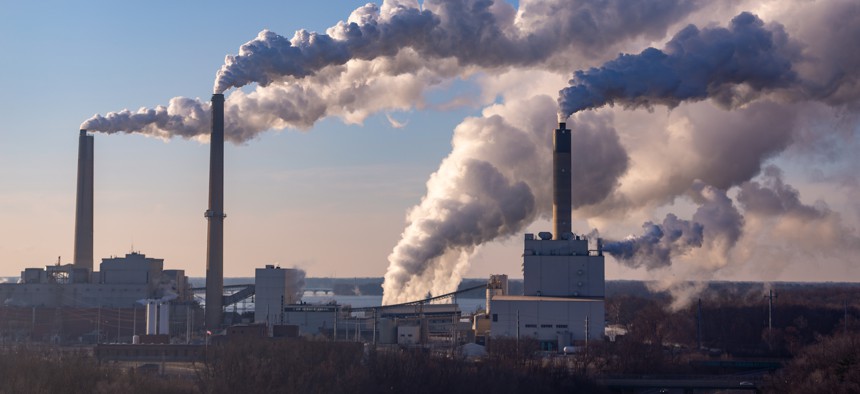House Sends Multibillion-Dollar Climate Bill to Biden for Signature

DWalker44 via Getty Images
The bill, already approved by the Senate, brings praise for its climate provisions but disappoints those hoping for state and local tax changes and more spending on housing.
The House on Friday sent President Biden what might be the defining piece of his administration—a package that includes around $370 billion for climate and energy programs.
The measure sends billions in climate funding to states and local governments—notably $4.75 billion to reduce greenhouse gas air pollution—and is the largest amount allocated to address climate change in U.S. history.
Democratic House Speaker Nancy Pelosi of California hailed the vote on the House floor as a “day of celebration” shortly before the measure passed 220-207.
Ticking off a number of major pieces of legislation passed by Democrats—the American Rescue Plan Act, the Infrastructure Investment and Jobs Act, and the semiconductor CHIPS Act—Pelosi described the passage of the Inflation Reduction Act as another “momentous step in our robust agenda.”
The Senate approved the massive bill on Sunday.
Republicans, however, blasted the purely partisan Democratic measure. “This bill has had no Republican input,” Rep. Michael Burgess, a Texas Republican, said on the House floor. “Billions of government spending is the last thing we need during record high inflation.”
In addition to what Democrats termed “historic amounts” of funding to combat climate change, the bill would provide $64 billion to extend, for another three years, health insurance subsidies created in the American Rescue Plan Act. State health officials are worried that about 3 million people would no longer be able to afford health care coverage if the subsidies were allowed to expire at the end of the year.
The measure also allows Medicare to negotiate with drug companies to lower the prices seniors on Medicare pay for medication.
A Win for Local Governments
The vote is a victory for local governments that pushed for its passage.
Democrats' legislation would take “critical steps to slash carbon emissions, lower costs for families, provide affordable health care, and so much more,” Tom Cochran, CEO and executive director of the U.S. Conference of Mayors, said in a statement last week.
However, there was also blowback about what was cut out of the $1.75 trillion Build Back Better Plan the House passed last year, before it was stripped down in the Senate to win the support of Sen. Joe Manchin, a centrist West Virginia Democrat who objected to the size of the spending.
While praising the climate and health care provisions in the bill, the National Association of Counties expressed some disappointment that the measure does not address raising the state and local tax—or SALT—cap.
The larger Build Back Better bill would have increased the amount of local and state taxes people are allowed to deduct from their federal taxes. Local officials said the $10,000 limit imposed as part of the Republicans’ 2017 tax overhaul makes it more difficult to raise revenue through local tax increases because taxpayers cannot get as much back through their federal taxes. House Democrats had proposed raising the cap to $72,500.
However, Democrats in the SALT Caucus, a group of House members who vowed to raise the cap, opted to vote for the so-called Inflation Reduction Act, saying it would bring benefits to their districts, even though it did not address the SALT cap.
“I’m voting for the Inflation Reduction Act of 2022 because it is good for my constituents, good for America, and great for the environment,” Rep. Thomas Suozzi, a New York Democrat and co-chair of the SALT Caucus, said in a statement earlier this week.
“The Inflation Reduction Act does not increase personal income taxes and ‘No SALT, no deal’ does not apply. If any change is proposed in the personal income tax rate, I will insist that we restore the State and Local Tax Deduction,” he said.
“This legislation is a huge win for New Jersey,” Rep. Josh Gottheimer, a New Jersey Democrat and another co-chair of the caucus, said on Twitter. “It will lower prescription drug prices, especially for seniors, boost domestic manufacturing, provide support for families struggling with the high cost of health insurance, create jobs, and put in place the most important climate investments in our nation’s history.
“If someone tries to raise the tax rates on families in my District, I will insist that we restore the State and Local Taxes deduction,” he tweeted.
The National Low Income Housing Coalition and the National Alliance to End Homelessness also said they were disappointed in the bill, because billions in funding for housing programs in the Build Back Better bill were cut.
“Housing costs are a primary driver of rising inflation. An ‘inflation reduction act’ that doesn’t address skyrocketing rents and dwindling housing supply misses the point and leaves the lowest income renters and people experiencing homelessness to suffer from continued inaction,” Diane Yentel, president and CEO of the coalition, said last week.
Kery Murakami is a senior reporter for Route Fifty based in Washington, D.C.
NEXT STORY: Public Health Agencies Lack Money to Combat Climate Threats






